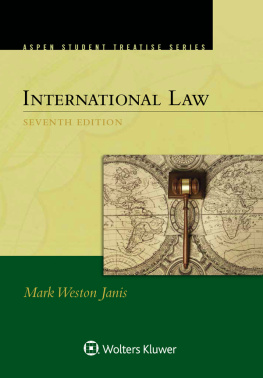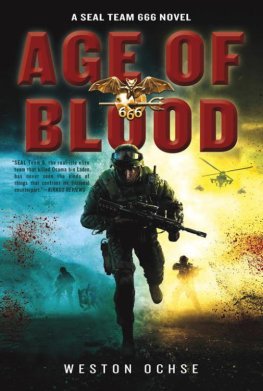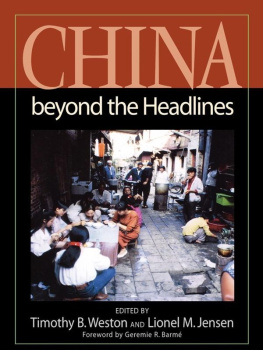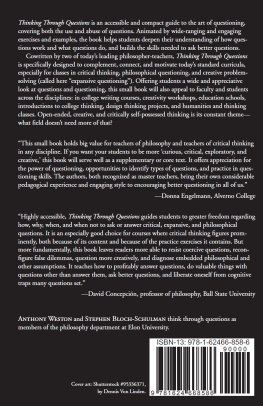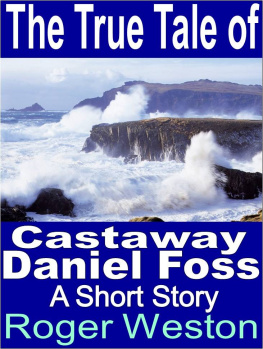Mark Weston Janis - Aspen Treatise for International Law
Here you can read online Mark Weston Janis - Aspen Treatise for International Law full text of the book (entire story) in english for free. Download pdf and epub, get meaning, cover and reviews about this ebook. year: 2016, publisher: Kluwer Law, genre: Politics. Description of the work, (preface) as well as reviews are available. Best literature library LitArk.com created for fans of good reading and offers a wide selection of genres:
Romance novel
Science fiction
Adventure
Detective
Science
History
Home and family
Prose
Art
Politics
Computer
Non-fiction
Religion
Business
Children
Humor
Choose a favorite category and find really read worthwhile books. Enjoy immersion in the world of imagination, feel the emotions of the characters or learn something new for yourself, make an fascinating discovery.
- Book:Aspen Treatise for International Law
- Author:
- Publisher:Kluwer Law
- Genre:
- Year:2016
- Rating:5 / 5
- Favourites:Add to favourites
- Your mark:
- 100
- 1
- 2
- 3
- 4
- 5
Aspen Treatise for International Law: summary, description and annotation
We offer to read an annotation, description, summary or preface (depends on what the author of the book "Aspen Treatise for International Law" wrote himself). If you haven't found the necessary information about the book — write in the comments, we will try to find it.
Aspen Treatise for International Law — read online for free the complete book (whole text) full work
Below is the text of the book, divided by pages. System saving the place of the last page read, allows you to conveniently read the book "Aspen Treatise for International Law" online for free, without having to search again every time where you left off. Put a bookmark, and you can go to the page where you finished reading at any time.
Font size:
Interval:
Bookmark:


EDITORIAL ADVISORS
Erwin Chemerinsky
Dean and Distinguished Professor of Law
Raymond Pryke Professor of First Amendment Law
University of California, Irvine School of Law
Richard A. Epstein
Laurence A. Tisch Professor of Law
New York University School of Law
Peter and Kirsten Bedford Senior Fellow
The Hoover Institution
Senior Lecturer in Law
The University of Chicago
Ronald J. Gilson
Charles J. Meyers Professor of Law and Business
Stanford University
Marc and Eva Stern Professor of Law and Business
Columbia Law School
James E. Krier
Earl Warren DeLano Professor of Law
The University of Michigan Law School
Richard K. Neumann, Jr.
Professor of Law
Maurice A. Deane School of Law at Hofstra University
Robert H. Sitkoff
John L. Gray Professor of Law
Harvard Law School
David Alan Sklansky
Stanley Morrison Professor of Law
Stanford Law School
Faculty Co-Director
Stanford Criminal Justice Center

Copyright 2016 CCH Incorporated.
Published by Wolters Kluwer in New York.
Wolters Kluwer Legal & Regulatory Solutions U.S. serves customers worldwide with CCH, Aspen Publishers, and Kluwer Law International products. (www.WKLegaledu.com)
No part of this publication may be reproduced or transmitted in any form or by any means, electronic or mechanical, including photocopy, recording, or utilized by any information storage or retrieval system, without written permission from the publisher. For information about permissions or to request permissions online, visit us at www.WKLegaledu.com, or a written request may be faxed to our permissions department at 212-771-0803.
To contact Customer Service, e-mail , call 1-800-234-1660, fax 1-800-901-9075, or mail correspondence to:
Wolters Kluwer
Attn: Order Department
PO Box 990
Frederick, MD 21705
eISBN 978-1-4548-7712-7
Library of Congress Cataloging-in-Publication Data
Names: Janis, Mark W., author.
Title: International law / Mark Weston Janis, William F. Starr Professor of Law, University of Connecticut, Visiting Fellow in Law, formerly Reader in Law. University of Oxford.
Description: Seventh edition. | New York : Wolters Kluwer, 2016. | Includes bibliographical references and index.
Identifiers: LCCN 2015043506 | ISBN 9781454869504
Classification: LCC KZ3140.J36 A35 2016 | DDC 341--dc23
LC record available at http://lccn.loc.gov/2015043506
About Wolters Kluwer Legal &
Regulatory Solutions U.S.
Wolters Kluwer Legal & Regulatory Solutions U.S. delivers expert content and solutions in the areas of law, corporate compliance, health compliance, reimbursement, and legal education. Its practical solutions help customers successfully navigate the demands of a changing environment to drive their daily activities, enhance decision quality and inspire confident outcomes.
Serving customers worldwide, its legal and regulatory solutions portfolio includes products under the Aspen Publishers, CCH Incorporated, Kluwer Law International, ftwilliam.com and MediRegs names. They are regarded as exceptional and trusted resources for general legal and practice-specific knowledge, compliance and risk management, dynamic workflow solutions, and expert commentary.
To Janet and the boys
Summary of Contents
Contents
Preface
This book endeavors to introduce the discipline of international law in such a way as to clarify and order a dauntingly complex and variegated subject. It is written with J. L. Brierlys English classic, The Law of Nations, in mind. It is my aim to provide a book, as Brierly did first in 1928 and last in 1955, not intended as a substitute for the standard text-books on the subject, but as an introduction either for students who are beginning their law courses, or, I hope, for laymen who wish to form some idea of the part that law plays, or that we may reasonably hope that it will play, in the relation of states. Two important distinctions, besides the obvious one of relative modernity, distinguish Brierlys book and mine. First, Brierlys book drew heavily, though far from exclusively, on British practice in international law; mine emphasizes the international practice of the United States. Second, this books ambit is somewhat broader than Brierlys in that I introduce international law not only in its traditional public or interstate sense, but also in its increasingly important private and commercial aspects.
Between this seventh edition and the earlier editions (1988, 1993, 1999, 2003, 2008, 2012) more changes have been made to the substantive international law of the later chapters than to the early conceptual chapters that introduce international legal rules and process. Besides just keeping up-to-date, this new edition captures, I hope, the spirit of our transition to the post-Cold War era, the rise of such recent topics as the specter of international terrorism, the emergence of international organizations, the proliferation of international courts and tribunals, and the problems posed by American exceptionalism, both judicial and political, to international law. Brierlys Law of Nations faced similar transitional tasks: the first two editions of 1928 and 1936 were written amidst all the doubts about the viability of international law in the interwar period, the third edition of 1942 emerged in the carnage of World War II, and the fourth and fifth editions of 1949 and 1955 sought to capture the flavor of the Cold War and the new threat of nuclear annihilation. My book shares Brierlys view, expressed in his fourth edition, that international law is neither a myth on the one hand, nor a panacea on the other, but just one institution among others which we can use for the building of a saner international order.
Three questions more or less structure the text: What are international legal rules? What is international legal process? What role does international law play in international relations? Answering the questions in order yields an unremarkable organization for an international law book except that the law of treaties is discussed alongside the topic of treaties as a source of international law, public international arbitration and the International Court follow immediately after the role of international law in the municipal courts, and, as aforementioned, the private as well as the public part of international law is introduced. The book is meant to reflect international law generally and should prove a useful read either on its own or as a supplement to any of the standard American legal or political casebooks on the subject. Except for a fuller rendering of some sources normally abbreviated, the standard forms of American legal citation have been followed in the footnotes.
Although the book and its faults are mine, I know that its perspectives have been shaped and sharpened by the able scholars who taught me, especially Thomas Kuhn and Joseph Strayer at Princeton, Brian Simpson and Humphrey Waldock at Oxford, and Louis Sohn and Henry Steiner at Harvard; to them I am particularly grateful. Three years in the Navy, three more practicing international law with Sullivan & Cromwell in New York and Paris, and now thirty-five years teaching in the United States, England, and continental Europe have given me certain insights but denied me others. Let me thank friends and colleagues who have helped along the way: Dapo Akende, William Alford, Nicholas Bamforth, David Bederman, Rudolf Bernhardt, Phillip Blumberg, Fernand Boulan, Tony Bradley, John Bridge, Ian Brownlie, Thomas Buergenthal, George Bustin, William Butler, Dan Caldwell, David Caron, Dominique Carreau, Fred Chapman, Frederick Chen, Sarah Cox, Paul Craig, James Crawford, Donald Daniel, Yves Daudet, Ruth Deech, Jozef Deelen, Laura Dickinson, Carolyn Evans, Franois Ewald, Tim Fisher, Francesco Francioni, James Friedberg, Jochen Frowein, Albert Gastmann, Martin Glassner, Edward Gordon, Richard Graving, Christine Gray, Nicholas Grief, Keith Highet, Garfield Horn, James Hyde, Olimpiad Ioffe, Karel Jungwiert, Richard Kay, Benedict Kingsbury, Harold Koh, Hans Christian Krger, Molly Land, Dominik Lasok, Herbert Lazerow, Detlef Leenen, Randall Lesaffer, Michel Lesage, Vaughan Lowe, Houston Lowry, Robert Lutz, Hugh Macgill, Daniel Magraw, Aleth and Phillipe Manin, Geoffrey Marshall, Aileen McColgan, Myres McDougal, Willajeanne McLean, Thomas Morawetz, John Murphy, James Nafziger, Ved Nanda, Nell Newton, John Noyes, Daniel OConnell, Mary Ellen OConnell, William Park, Jeremy Paul, David Perrott, Ellen Peters, Istvan Pogany, David Pugsley, Michael Reisman, Eibe Riedel, Adam Roberts, Horace Robertson, Alfred Rubin, Dan Sarooshi, George Schatzki, Henry Schermers, Stephen Schwebel, David Seymour, Anne-Marie Slaughter, Ted Stein, Dennis Stone, Kurt Strasser, Robert Summers, Stefan Talmon, Nicholas Triffin, Jean Van den Eynde, Willem Van Genugten, Brian Walsh, Wang Tieya, Ruth Wedgwood, Christopher Weeramantry, Carol Weisbrod, Luzius Wildhaber, Richard Wilson, Ineta Ziemele, and Elizabeth Zoller. Thanks are also due to my students at Connecticut, Cornell, UCLA, Oxford, Paris, Strasbourg, Tilburg, Mnster, and Riga; to my research assistants, James Streeto, Peter Morgan, John Fitzpatrick, Ricardo Sousa, Richard Wilde, Jennifer Glaudemans, Dora Ziamou, Woo Lee, Susanne Brose, Bridgett Sandusky, Michael Casey, Brent Houston, John Von Kohorn, Robert Menzel, Rytas Stankunas, Eric Hisey, Blake Ratcliff, Darcy Jones, Scott Schaeffer, Rebecca Ullman, Joanne Cossitt, Derek Ghan, Nancy Livak, Joanna Taatjes; David Woods, Kyle Zelazny, Adam Yagaloff, Lauren Birt, Michael Knortz, and Hilary Polak; to my secretaries and typists, Kathe Kane, Sharon Lizak, Sandra Michalik, Delia Roy, Joan Wood, and Margaret Kent; to Richard Heuser, Carol McGeehan, David Bemelmans, Elizabeth Kenny, Richard Kravitz, Dan Mangan, Jessica Barmack, Anne Sloniker, Eric Holt and John Devins at Little, Brown and Aspen; and, of course, to Janet, Matthew, Robert, Philip, and Edward.
Font size:
Interval:
Bookmark:
Similar books «Aspen Treatise for International Law»
Look at similar books to Aspen Treatise for International Law. We have selected literature similar in name and meaning in the hope of providing readers with more options to find new, interesting, not yet read works.
Discussion, reviews of the book Aspen Treatise for International Law and just readers' own opinions. Leave your comments, write what you think about the work, its meaning or the main characters. Specify what exactly you liked and what you didn't like, and why you think so.

